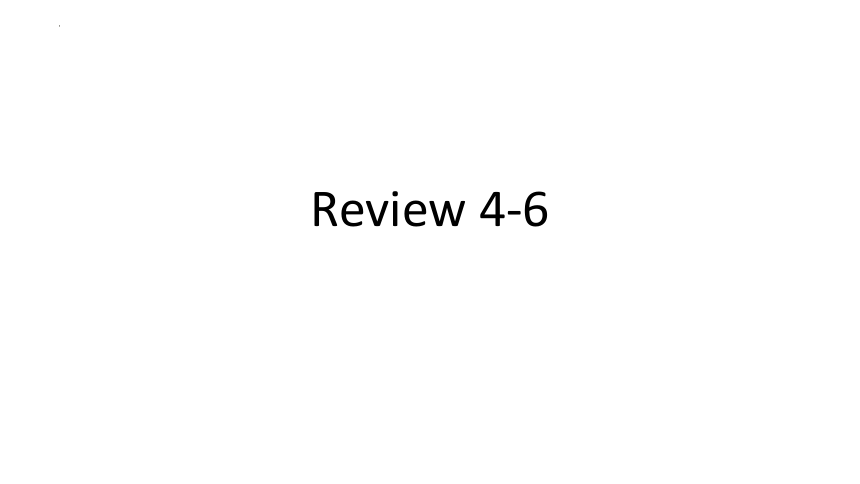(
课件网) Review 4-6 library canteen playground gym 36% Woman 26% Kid computer computer room 36% Woman 48% Man 26% Kid classroom Is their school big No, it’s small. Is there a library Yes, there is. Are there many classrooms Yes, there are. Are there many books in it Yes, there are. Grammar I 用am, you用are, is 连着他她它。 eg: I am from China. 我来自中国。 He is from Japan. 他来自日本。 She is from Britain. 她来自英国。 2. have got表示“有” I/You/We + have got He/She/It/人名+has got eg: I have got black hair. 我有黑色的头发。 He /She has got red hair. 他/她有红色的头发。 主语是第三人称单数时,谓语动词+“s” eg: He /She likes Art. 他/她喜欢美术。 We have classes in the classroom. We often read in the library. We have lunch in the canteen. We play sports on the playground. We have computer class in the computer room. _____ is Mary. A. He B. She C.her He _____ dogs. A.likes B.like C.liking Tim _____ got black hair. A.is B.has C.have B A B Mr Crow _____ from Britain. A.am B.is C.are _____ there a canteen in your school A. Is B. Are C. Do B A 一.读句子,判断句子中是否有错误,对(√)错(×) ( )1. They is from Britain. ( )2. I have get red coat. ( )3. He is our Art teacher. ( )4. Where is my pencil case ( )5. Here’s my prize. ( )6. She am ten. ( )7. He is our school teachers. × × √ √ √ × × 情景交际 1. 当你想问别人的家是否很大时,你可以问: Is your home big 2. 当你想告诉别人你有一个铅笔盒时,你可以说: I’ve got a pencil case. 3. 当你想让别人帮助你时,你可以说: Help me, please. 4. 当你想说她喜欢在图书馆读书时,你可以说: She likes reading books in the library. 5. 当你想问别人那里是否有体育馆时,你可以问: Is there a gym draw She can draw. Let's learn. sing He can sing. Let's learn. swim They can swim. Let's learn. dance She can dance. Let's learn. fly a kite He can fly a kite. Let's learn. play football play basketball play table tennis guitar play the guitar Let's learn. play the piano ride a horse He can ride a horse. Let's learn. stand on my head I can stand on my head. Let's learn. 二、重点句子 (1) I can sand on my head. 我会倒立 I can’t ski. 我不会滑雪 Can you play table tennis 你会打乒乓球吗 Yes, I can./ No, I can’t. 是的,我会/不,我不会。 (2)He can stand on his head. 他会倒立。 He can’t play the piano. 他不会弹钢琴。 Can he play football 他会踢足球吗? Yes, he can./ No, he can’t. 是的,他会/不,他不会。 (3)She can stand on her head. 她会倒立。 She can’t swim. 她不会游泳。 Can she ride a horse 她会骑马吗? Yes, she can./No, she can’t. 是的,她会/不,她不会。 四、重点语法 1.can 和can not can是一个情态动词,表示“能,可以”的意思,用法也非常的简单,只要直接把句子的主语放在“can”的前面就可以了,比如: I can swim. 我会游泳。 He can skate. 他会滑冰。 We can sing English songs. 我们会唱英文歌。 相反can not,表示“不能……”也非常的简单,只要在“can”的后面加上 “not”就可以了,当然“cannot”是全称,它还可缩写成“can’t” ,如: I can’t sing. 我不会唱。 He can’t ... ...

